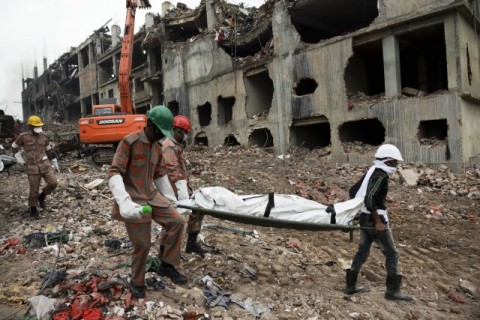Western multinationals are behind disasters like the Bangladesh factory collapse. Will public outrage and a new labor agreement lead to improvements for workers? The article from The American Prospect reports a long journey of finding justice for Bangladesh .
Robert Kuttner has the story
Fashioning Justice for Bangladesh
On April 24, the Rana Plaza garment factory in Bangladesh collapsed, killing 1,129 workers and injuring at least 1,500 more. Most were young women earning about $37 a month, or a bit more than a dollar a day. The collapse was the worst disaster in the history of the global garment industry, evoking the 1911 Triangle Shirtwaist factory fire in New York City. The Rana Plaza factory made apparel for more than a dozen major international fashion brands, including Benetton, J.C. Penney, and Wal-Mart. This was the third major industrial accident in Bangladesh since November, when 112 people were killed in a fire at a garment factory producing mainly for Wal-Mart. At Rana Plaza, cracks appeared in the eight-story building the day before it collapsed. Police ordered an evacuation of the building. But survivors say they were told that their pay would be docked if they did not return to the factory floor, and most did.
Bangladesh, a nation of more than 160 million, has some 4 million garment-industry workers and 40 building inspectors. After China, it is the world’s second-largest apparel producer: a destination of choice for the fashion industry because workers effectively have no rights and are among the world’s most desperately poor people. These tragedies underscored not just the brutality of the global garment industry but also the bankruptcy of a voluntary system of industry-sponsored factory certification by nonprofits funded by the big fashion brands.
In August 2012, one of the most prestigious monitoring groups, Social Accountability International, gave a factory owned by Ali Enterprises in Karachi, Pakistan, a clean bill of health. A month later, the factory burned, killing some 300 workers who were trapped behind locked doors.
In January 2012, Apple selected the monitoring group Fair Labor Association (FLA) to review conditions in the factories of Foxconn, its contractor in China. Two weeks later, The New York Times published an exposé of grim conditions, including 70-hour workweeks and a spate of worker suicides. In February, the head of the FLA toured Foxconn and pronounced the facilities “first class.”
Thanks to the notoriety of the Rana Plaza collapse and the persistence of the global labor movement, anti–sweatshop activists in the U.S. and Europe, and an independent, labor-affiliated advocacy group, the Worker Rights Consortium (WRC), the tragedy in Bangladesh could open the door to more robust corporate accountability. A legally binding contract, signed May 15 by some 40 fashion brands, commits the big retailers and apparel producers to take responsibility for what happens in the factories that make the clothing they sell.
Under the Accord on Building and Fire Safety in Bangladesh, the Western fashion companies will invest millions of dollars in factory improvements and provide longer-term supply contracts so that factory owners have the cash flow and confidence to invest in upgrades. The brands agree to independent safety inspections whose results are made public, with binding arbitration in the event of disputes and an enforceable commitment by the brands to terminate business with factories that do not meet safety standards. A seven-person committee enforces the agreement, with three members from labor groups, three from the fashion brands, and a representative of the International Labor Organization (ILO) in Geneva, a U.N.–affiliated watchdog body founded in 1919 to promote worker rights, as chair and tiebreaker. The agreement, however, is about safety. It does not address wages per se, but it does commit the fashion brands to require the large factories they purchase from to allow union representatives to help train factory workers in safety monitoring. Sponsors hope that a union presence will lead to better wages.
By July, some 70 major European fashion brands and retailers with production in Bangladesh had signed the accord. Only a handful of U.S. companies joined, including PVH (the parent company of Calvin Klein and Tommy Hilfiger), Sean John, and Abercrombie & Fitch. Although Europe purchases more than double the volume of clothes from Bangladesh than the United States does, the deal would be more significant if the bigger American retailers such as Wal-Mart and the Gap joined, since both have resisted codes of conduct with independent monitoring and enforcement. Instead, Wal-Mart, the Gap, and 15 other North American brands have created a rival, purely voluntary agreement. Their plan for better factory safety, announced in early July with the Bipartisan Policy Center providing the window dressing, has no arm’s-length monitoring, no penalties, no enforceable rights, and no role for unions.
Depending on how well it is enforced, the European accord could be a turning point that could lead to a new wave of rights for workers in Third World manufacturing. “The business model of the apparel industry logically leads to sweatshops,” says Scott Nova, executive director of the WRC. “The Bangladesh accord holds the promise of altering the model. But we expect that there will be extensive battles ahead.”
